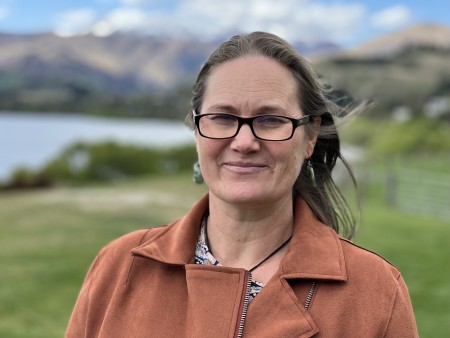Councillor questions 'pattern of obstruction' from QLDC staff on Lakeview

A Queenstown Lakes District councillor says a move to debate how decisions on the controversial billion-dollar Lakeview development are made was blocked by the mayor and chief executive, another step in what she suggests is a "pattern of obstruction" by council staff.
Queenstown-Whakatipu ward councillor Niki Gladding says she delivered a notice of motion with the purpose of giving councillors the opportunity to decide whether certain decisions affecting the implementation of the Lakeview master plan should be signed off by the elected council rather than the chief executive.
The notice of motion was signed by three other councillors – a third of 12 elected members – and delivered to council chief executive Mike Theelen on May 29.

Councillor Niki Gladding: 'Notices of motion are fundamental to local democracy...That process needs to be protected rather than undermined'.
However, in a blog post published this weekend, Ms Gladding says under the direction of Mayor Glyn Lewers the notice was refused, after two separate sets of external legal advice were sought – paid for by ratepayers.
Although the exact details of the legal advice are unknown, Ms Gladding says the mayor said in a memo accompanying his decision to refuse the notice of motion that the notice didn’t meet the decision-making requirements of the Local Government Act and it concerned a matter for which decision-making authority had been delegated to the Audit, Finance and Risk Committee of the council.
Seven new elected members joined the council at October’s local government elections, and it is the view of Ms Gladding that the new council should be given a chance to debate the existing delegation for Lakeview decision-making that sits with the chief executive.
Ms Gladding says it is the second time council staff have produced advice that, she thinks, has undermined an informed debate about the Lakeview decision-making delegation.
She says it feels like a “pattern of obstruction”.
Last year, after specifically directing staff to provide options for the division of decision-making power between the chief executive and the elected council, councillors received a report that failed to provide any options, she says.
Instead, the terms of reference for consultant report writer Bruce Robertson required he confirm that the existing delegations to the chief executive were appropriate, she says.
“The elephant-sized problem in the room is the strongly-held belief that councillors should be kept at arms-length from the execution of commercial agreements, regardless of the complexity and the level of strategic decision-making required under those agreements – sometimes over long periods of time.
“It’s a position that seems to be deeply entrenched in QLDC’s leadership culture, and regularly supported by the legal advice and expert opinions that council officers provide to support their recommendations.
“That advice is usually hung on the intangible concept of business ‘best practice’. But under the Local Government Act 2002, the principle of undertaking commercial transactions in accordance with sound business practices and the principle of conducting business in an open, transparent, and democratically accountable manner, are not mutually exclusive. In fact, the latter principle trumps the former.”
It is Ms Gladding’s view councillors needn’t and shouldn’t lose control of decision-making under commercial agreements.
“With every commercial deal the council agrees to enter into, there needs to be an open, transparent, and informed debate about which decisions should be delegated - and what limitations should be applied - and about which decisions will require a report and options, and debate and a vote, for the record. And the route to reclaiming delegated power needs to be clearly understood.
“If councillors don’t require that, if they continue to delegate decision-making power too easily, if they prefer the corporate narrative to the Purpose and Principles of the LGA, and if they don’t challenge the push back when they try to make ‘commercial’ decisions in the best interests of our communities, then in my opinion elected members will find themselves increasingly rubber-stamping budget overruns, and increasingly powerless to make a difference.”
Mayor Glyn Lewers and council chief executive Mike Theelen have been approached for comment.
It is Ms Gladding's view "notices of motion are fundamental to local democracy" as they allow all elected members to be proactive and to bring matters to the table when they need to be debated.
"That process needs to be protected rather than undermined."
Read Niki Gladding's full statement here.
Speaking with Crux this morning, Ms Gladding says she thought a lot about her reasons for going public with her post.
"Firstly, the mayor needs to be accountable for his decision and, in my opinion, misuse of Standing Orders. Sometimes, sunshine is the best medicine.
"Secondly, I wanted to set out in some detail - for staff and councillors and the community - why this matters. It's not just about not being able to donate the Lakeview delegation, it's about our ability to debate notices of motion that the mayor might not like, and it's about our ability to reclaim delegated power.
"I could have tried to have these conversations internally, but it's very hard to change things without a bit of public pressure."
QLDC councillors voted in 2017 to give the council's chief executive exclusive individual power over all aspects of the billion-dollar Lakeview project. Details of the agreement between the council and the Australian developer have not been released to ratepayers, even though the deal has so far resulted in a rates increase and multimillion-dollar losses for the council.
Read more:
Lakeview: Robertson report says councillors should stay out of the loop
Lakeview report: Councillors asked to trust CEO in spite of $42m mystery
Councillor Gladding tries to force Lakeview project into the open

























